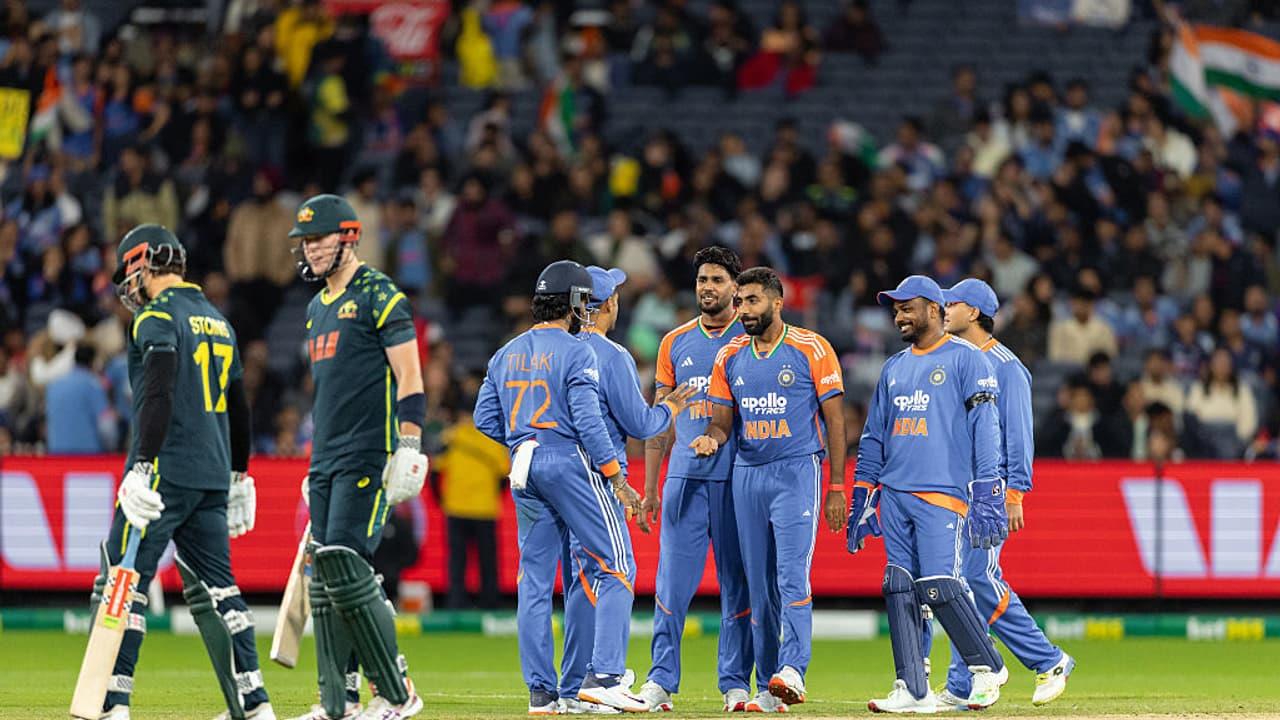
AUS Vs IND, 2Nd T20I: 5 Talking Points From India's 4-Wicket Defeat To Australia At MCG
Team India suffered a four-wicket defeat against Australia in the second T20I, trailing the five-match series 0-1. Despite Abhishek Sharma's valiant 68, an early batting collapse restricted India to 125, a total Australia chased down in 13.2 overs.
Team India suffered a four-wicket defeat to Australia in the second T20I of the five-match series at the Melbourne Cricket Ground (MCG) on Friday, October 31. After posting 125 on the board, the Men in Blue failed to defend it as the hosts chased down a 126-run target in 13.2 overs.
Mitchell Marsh played a captain's innings of 46 off 26 balls and formed an opening 51-run stand with Travis Head, who scored 28 off 15 balls. Josh Inglis (20) and Mitchell Owen (14) made valuable contributions in the middle order to guide Australia to victory. For India, Jasprit Bumrah (2/26), Varun Chakravarthy (2/23), and Kuldeep Yadav (2/45) picked two wickets each.
As Team India trails 0-1 in the five-match T20I series, let's take a look at key takeaways from the Men in Blue's defeat at the MCG.
After being put into bat first by Australia skipper Mitchell Marsh, Team India suffered an early collapse as they were reduced to 49/5, putting the visitors under pressure, and were on the verge of an early finish. The likes of vice-captain Shubman Gill (5), Sanju Samson (2), Suryakumar Yadav (1), and Tilak Varma (0) failed to make an impact, exposing the team's fragile top order once again.
Axar Patel (7) and Shivam Dube (4) also failed to deliver when they were needed the most. The shuffle in the batting line-up appeared to have disrupted the team's rhythm and unsettled the middle order, resulting in a lack of stability and intent during crucial overs.
Abhishek Sharma was the star performer for Team India as his valiant knock of 68 off 37 balls steadied the visitors' ship. Despite the batting collapse, the southpaw was not unfazed by the situation as he stuck to his natural attacking style and counterattacked Australian bowlers with his composure and fearless strokeplay, completing his fifty in just 23 balls.
Abhishek's knock was a lone spark in an otherwise India's disappointing show at the MCG. Had it not been for Abhishek Sharma, Team India would have struggled to even cross the 100-run mark, as his counterattack innings gave the visitors a fighting chance against Australia. Such was the impact of his innings that it briefly shifted the momentum in India's favour, highlighting his temperament under pressure and ability to perform in challenging conditions.
One of the key talking points from India's defeat to Australia was the surprise promotion of Harshit Rana in the batting order. After the fall of the fifth wicket, many expected Shivam Dube to walk in, but the team management's decision to send Harshit up the order surprised many, signaling an experimental approach in strengthening India's lower order of the batting line-up.
The team management's gamble to promote Harshit Rana up the order partially paid off as he stitched a crucial 56-run partnership for the sixth wicket with Abhishek Sharma to revive India's innings. The bold decision by Gautam Gambhir reflected his intent to test India's bench strength in pressure situations, though it highlighted the team's middle-order strategy, which is still in work in progress.
Another talking point from India's defeat is skipper Suryakumar Yadav's struggling form. In the first T20I, the 35-year-old stormed back to form with an unbeaten knock of 39 off 24 balls before the match was abandoned due to rain in Canberra. However, Suryakumar failed to carry on that momentum into the second T20I, falling cheaply for just 1.
Suryakumar Yadav's cheap dismissal raised concerns about whether his added responsibility as a captain is affecting his natural free-flowing batting style and confidence at the crease. Ever since he was appointed the full-time T20I captain in July last year, the veteran batter has scored just 370 runs, including two fifties, at an average of 19.47 in 24 matches, raising questions over whether the pressure of leadership has impacted his rhythm and shot selection.
Though the defeat was evident, there was a brief phase of resurgence led by Jasprit Bumrah and Varun Chakravarthy, who picked two wickets to momentarily halt Australia's momentum. After Mitchell Marsh's dismissal at 87/2, Australia were reduced to 112/4 with Varun Chakravarthy and Kuldeep Yadav taking a wicket of Josh Inglis and Tim David, respectively.
In the 13th over of Australia's run chase, Jasprit Bumrah was on the verge of a hat-trick by taking two wickets of Mitchell Owen and Matthew Short on the trot, but narrowly missed out as his third delivery was defended by Xavier Bartlett. Eventually, the late resurgence from the Indian bowlers was not enough to change the outcome, as Australia comfortably chase the 126-run target with 40 balls to spare.
Legal Disclaimer:
MENAFN provides the
information “as is” without warranty of any kind. We do not accept
any responsibility or liability for the accuracy, content, images,
videos, licenses, completeness, legality, or reliability of the information
contained in this article. If you have any complaints or copyright
issues related to this article, kindly contact the provider above.

















Comments
No comment